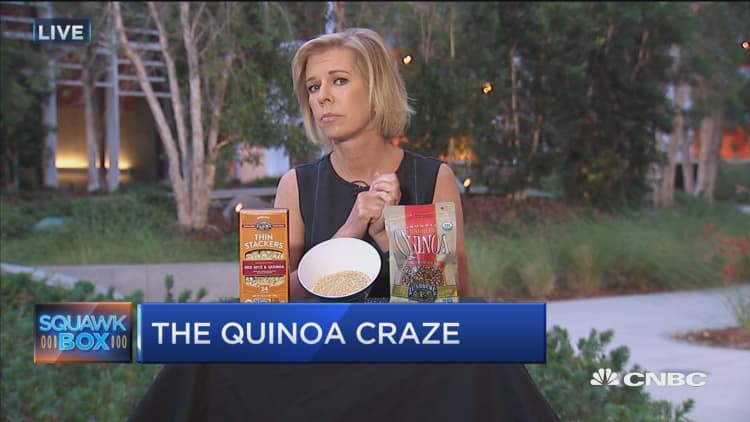
California's largest cash crop is marijuana, aka "weed."
But there's another weed taking root in the Golden State, one being called a "super food": quinoa.
"We're really excited about it," said Bryce Lundberg of Lundberg Family Farms. "Quinoa cakes, quinoa entrees, quinoa snacks."
Quinoa has been called "the mother grain" by the Andean Indians who originally grew it, but it's now being adapted to a very different climate.
"We've been experimenting with it for over five years," said Tim Schultz, head of research and development for the farm. Lundberg is best known for organic rice and grains sold at chains such as Whole Foods, but it saw an opportunity in quinoa, as more Americans look for "super foods" and plant-based diets. Quinoa contains all essential amino acids and protein. It has always been grown high up in the Andes of Peru, Ecuador and Brazil. "A lot of people will come to us and say, 'Well, you've got to grow it at 10,000 feet,'" said Lundberg, "and here we are at the edge of the Pacific Ocean, right? And what are we, maybe 50 feet, if that? And it's growing beautifully here."
Schultz walked through the farm pointing to different colored buds shooting up a few feet off the ground, some greenish white, others purple, all different "expressions" of quinoa, he explained. "This is called cherry vanilla," he said while knocking pollen off one plant. "When it's fully mature, it has a brilliant red color, looks almost like a fire out in the field."
Lundberg Family Farms produced its first commercial crop of organic quinoa in 2014 on only 40 acres. Last year that grew to 250 acres, and this year to 800. The results have been surprisingly positive.
"We're getting yields somewhere around 2,000 pounds per acre," said Schultz. "Most of the literature says that in South America, they're getting about 1,000 pounds per acre."
The farm is also experimenting with growing quinoa in the winter down in the California desert along the Mexican border, as well as far north in Washington state. There are challenges, mostly the weeds that flourish alongside the quinoa in organic farming. Lundberg has also had to develop the infrastructure to dry and store the crop. Even so, the company expects to produce 1.5 million pounds of quinoa this year, with a wholesale value above $3 million.
Quinoa has had a checkered history in the United States, even being called a "curse" after past efforts to grow it here failed for one reason or another. Lundberg has rolled out its own experiment very slowly, deciding to give quinoa a shot based on demand and on a desire to grow more organic produce closer to home. "A lot of our customers tell us that they like to have products with fewer miles on them," said Schultz.
There's one other thing that makes quinoa a great crop for California. It doesn't need much water. "We think we can dry-land farm it in so many places," Lundberg said. "I'm hopeful that quinoa will be as big for Lundberg Family Farms as rice is."
By the way, what does Lundberg see as the next super food? "I love fava beans," he said. "Aren't fava beans God's gift to nature?"
Stay tuned.
— By CNBC's Jane Wells. Follow her on Twitter: @janewells


